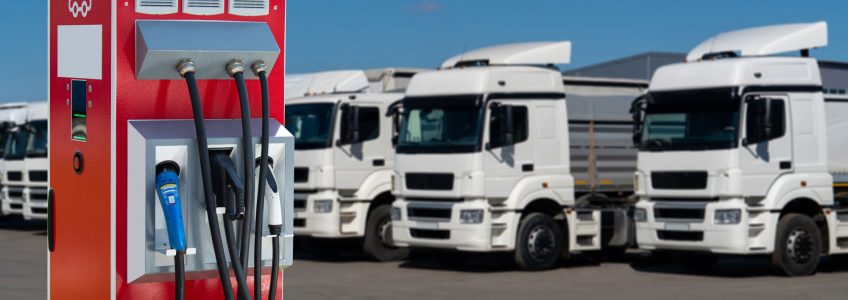
A number of startups and automotive giants have been busily working to electrify delivery and distribution trucks in the coming years: all-electric heavy-duty big rigs, semi-trucks, box trucks, delivery vans and more. While the major obstacles facing the electrification of the automotive industry are ones of scale, price points, battery technology, and charging station accessibility, advancements expected over the next 10 years will lead to more electric vehicles driving alongside or even replacing the diesel- and gas-powered trucks and vans that America relies on to carry goods (and people) across the country.
Here are five major players we are keeping an eye on in 2021.
BYD
Unlike other companies looking to disrupt the long-haul trucking industry, BYD is eyeing the short-haul goods movement sector, primarily in America’s ports, rail yards and freight-handling facilities. In 2020, it rolled out more of its battery-electric trucks to customers across the United States.
BYD’s Class 8 Day Cab has a range of 125 miles and a top speed of 65 miles per hour. The truck’s battery packs can recharge in as little as two hours with a high-speed direct current system or about 14 hours with a standard 240-volt charging system.
The company’s trucking division says its medium- and heavy-duty electric trucks are making up an increasing part of the company’s U.S. operations.
Chanje
One company aiming to electrify the package delivery industry is a Los Angeles-based, Chinese-backed startup called Chanje.
The company’s nearly 30-foot long V8100 electric medium-duty panel van can carry a 3-ton payload. What’s more, the van’s lithium-ion battery pack holds enough charge for a 150-mile range. According to the company, that’s more than double the number of miles the majority of commercial delivery vans drive in a day.
Daimler Trucks
In 2018, German automaker Daimler, the largest truck maker in the world, announced its all-electric 18-wheeler: the Freightliner eCascadia.
The big rig has a 250-mile range and was designed for regional transportation and port service. Daimler’s other all-electric model, the Freightliner eM2 106, has a 230-mile range and is intended for more local distribution and deliveries. Both the eCascadia and eM2 are currently planned to enter series production in late 2021. The company also has an all-electric box truck (for urban deliveries) and a school bus in the pipeline.
Nikola Motors
Few are likely to be familiar with the Phoenix-based startup that got the naming rights to Tesla’s first name. However, over the past five years, Nikola Motor Co. has slowly but surely emerged as a pioneer in this space.
The company has created the Nikola Two and the Nikola Tre for both European and North American markets. Each semi-truck is available with hydrogen fuel cell electric capabilities and their anticipated ranges are between 250 and 750 miles.
Lion
While the medium and urban truck markets are already getting attention from multiple truck manufacturers and a few startups, in the uncrowded school bus market there are only Lion Electric, Blue Bird, IC Bus, a division of Navistar, and Thomas Built, the division of Daimler Trucks/Freightliner.
Lion Electric has been around since 2008 and currently has an annual capacity to produce 2,500 trucks and buses per year. In addition to school buses, Lion Electric manufactures medium box and urban trucks, and specialty trucks such as garbage haulers. The usage profile for these trucks usually involves lower mileage per day and periods of overnight storage, lending themselves to excellent opportunities for electrification. Amazon is onboard with the opportunity to buy 2,500 Lion urban trucks and to potentially own 20% of the company.
For those considering converting all or part of their fleets to EVs, Advantage Asset Tracking has your entire fleet solutions roadmap covered backed by the worlds leading telematics provider, Geotab.
Our knowledgeable team will guide you through the entire selection process to ensure you make the right choice for your business!

